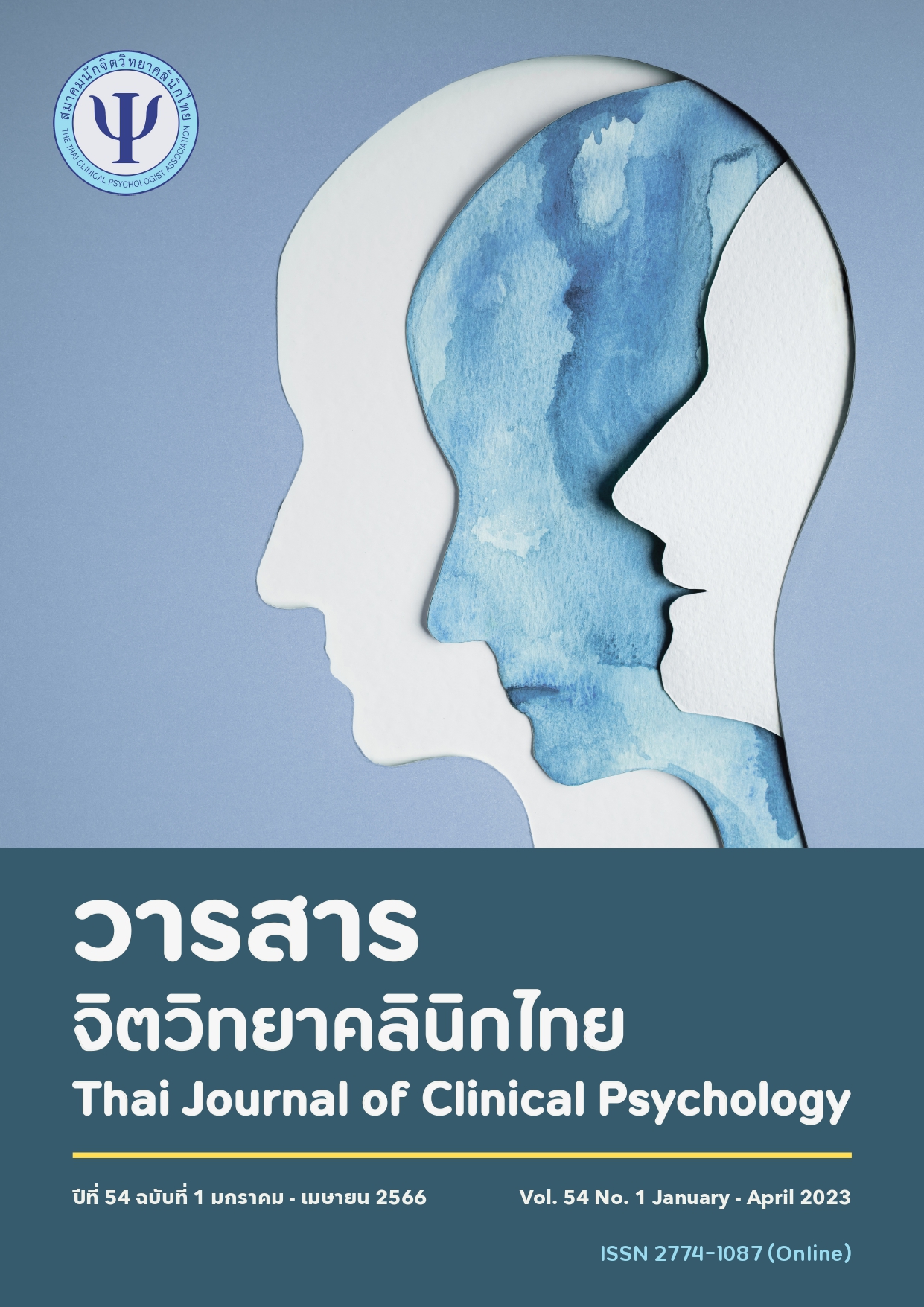Psychological Experiences after Receiving Counseling Service of the Medical and Public Health Professionals
Main Article Content
Abstract
Objective: The purpose of this research was to study the psychological experiences of the medical and public health professionals after receiving psychological counseling services. Methods: The research utilized Giorgi’s phenomenological method. The data were collected via semi-structured in-depth interviews. Six participants were recruited through purposive sampling method. The inclusion criteria were being medical and health professionals who voluntary received counseling services at least 1 session as well as completely finished all sessions. Results: The results revealed 3 main themes: (1) An awareness towards arising problems which consists of problem recognition, feelings towards arising problems, the perseverance and determination to liberate from the cycle of the problems. (2) An access to formal help which consists of a channel to sources of formal support, perception towards counseling, perception towards other sources of support and barriers of access to formal help. (3) A growth and flourishing after overcoming problems which includes the self-understanding of appropriately facing problems, the external factors affecting mental growth and flourishing, thriving through adversity. Conclusion: The findings suggested the way for public health and medical professional to seek the psychological assistance as well as obstacles and effects on psychological problem to self-awareness. Hence, the research findings can apply to support the psychological care of public health and medical professionals in the future.
Article Details

This work is licensed under a Creative Commons Attribution-NonCommercial-NoDerivatives 4.0 International License.
เรื่องที่ลงตีพิมพ์ในวารสารจิตวิทยาคลินิกแล้วถือเป็นลิขสิทธิ์การเผยแพร่โดยวารสารจิตวิทยาคลินิกแต่เพียงผู้เดียว การตีพิมพ์หรือเผยแพร่ซ้ำในที่อื่นต้องได้รับอนุญาตจากกองบรรณาธิการวารสารฯ
References
Brooks, S. K., Gerada, C., & Chalder, T. (2011). Review of literature on the mental health of doctors: Are specialist services needed?. journal of Mental Health, 20(2), 146–156. https://doi.org/10.3109/09638237.2010.541300
Calhoun, L. G., Tedeschi, R. G., & Amir, M. (2014). Handbook of posttraumatic growth: Research and practice. Psychology Press.
Costa, J., Marôco, J., Pinto-Gouveia, J., & Ferreira, C. (2016). Shame, self-criticism, perfectionistic self-presentation and depression in eating disorders. International Journal of Psychology and Psychological Therapy, 16(3), 315-328
Dwyer Kaluzna, S., Benken, S. T., Petzel Gimbar, R., & DiDomenico, R. J. (2020). Combating pharmacist burnout: A model for critical care clinical pharmacy faculty. JACCP: Journal of the American College of Clinical Pharmacy, 3(3), 655–662. https://doi.org/10.1002/jac5.1221
Garelick, A. I. (2012). Doctors' health: Stigma and the professional discomfort in seeking help. The Psychiatrist, 36(3), 81–84. https://doi.org/10.1192/pb.bp.111.037903
Giorgi, A. (1997). The theory, practice, and evaluation of the phenomenological method as a qualitative research procedure. Journal of Phenomenological Psychology, 28(2), 235–260. https://doi.org/10.1163/156916297x00103
Halder, S., & Mahato, A. K. (2013). Stress and psychological well being status among health care professionals. International Journal of Occupational Safety and Health, 3(1), 32–35. https://doi.org/10.3126/ijosh.v3i1.9099
Henderson, M., Brooks, S. K., del Busso, L., Chalder, T., Harvey, S. B., Hotopf, M., Madan, I., & Hatch, S. (2012). SHAME! self-stigmatisation as an obstacle to sick doctors returning to work: A qualitative study: Table 1. BMJ Open, 2(5). https://doi.org/10.1136/bmjopen-2012-001776
Hill, C. E. (2014). Helping skills: Facilitating exploration, insight, and action (4th ed.). American Psychological Association. https://doi.org/10.1037/14345-000
Joseph, S., Murphy, D., & Regel, S. (2012). An affective-cognitive processing model of post-traumatic growth. Clinical Psychology & Psychotherapy, 19(4), 316–325. https://doi.org/10.1002/cpp.1798
Perez-Rojas, A. E., Lockard, A. J., Bartholomew, T. T., Janis, R. A., Carney, D. M., Xiao, H., Youn, S. J., Scofield, B. E., Locke, B. D., Castonguay, L. G., & Hayes, J. A. (2017). Presenting concerns in counseling centers: The view from clinicians on the ground. Psychological Services, 14(4), 416–427. https://doi.org/10.1037/ser0000122
Ro, K. E., Gude, T., & Aasland, O. G. (2007). Does a self-referral counselling program reach doctors in need of help? A comparison with the general Norwegian doctor workforce. BMC Public Health, 7(1). https://doi.org/10.1186/1471-2458-7-36
Ro, K. E., Tyssen, R., Hoffart, A., Sexton, H., Aasland, O. G., & Gude, T. (2010). A three-year cohort study of the relationships between coping, job stress and burnout after a counselling intervention for help-seeking physicians. BMC Public Health, 10(1). https://doi.org/10.1186/1471-2458-10-213
Scholl, M. A. R. K. B., Ray, D. E. E. C., & Brady-Amoon, P. E. G. G. Y. (2014). Humanistic counseling process, outcomes, and research. The Journal of Humanistic Counseling, 53(3), 218–239. https://doi.org/10.1002/j.2161-1939.2014.00058.x
Spiers, J., Buszewicz, M., Chew-Graham, C. A., Gerada, C., Kessler, D., Leggett, N., Manning, C., Taylor, A. K., Thornton, G., & Riley, R. (2017). Barriers, facilitators, and survival strategies for GPS seeking treatment for distress: A qualitative study. British Journal of General Practice, 67(663). https://doi.org/10.3399/bjgp17x692573
Staiger, T., Waldmann, T., Rüsch, N., & Krumm, S. (2017). Barriers and facilitators of help-seeking among unemployed persons with mental health problems: A qualitative study. BMC Health Services Research, 17(1). https://doi.org/10.1186/s12913-017-1997-6
The Psychiatric Association of Thailand. (2020). Telephone psychological counseling program for healthcare professionals. Retrieved June 28, 2022, from https://www.thaidmh-elibrary.org/album/5326/


